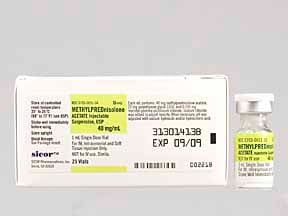
Depo-medrol Coupons & Savings Card – Discount Prices from $3.36
Brand for: Methylprednisolone
My prescription
Edit
1ML of 40MG/ML, Methylprednisolone (1 Vial)
Select pharmacy

CVS
$25.39
COUPON PRICE
Walmart
$3.36
COUPON PRICE
Albertsons
$10.60
COUPON PRICE
Walgreens
$10.97
COUPON PRICEDepo-medrol savings card
Show this card to your pharmacist
Walmart
$3.36
BIN
ID
PCN
GRP
019876
LHA4BC40F4
CHIPPO
LHX
Powered by
Related corticosteroids prescriptions
More prescriptions for ulcerative colitis
Related corticosteroids prescriptions
More prescriptions for ulcerative colitis
Price history for Depo-medrol (brand) & Methylprednisolone (generic)
1 Vial, 1ML of 40MG/ML
Average retail price for Depo-medrol
Average retail price for Methylprednisolone
Average SaveHealth price for Methylprednisolone
Our price history data is based on aggregated prescription data collected from participating pharmacies in America. Our prescription data updates daily to reflect the latest price changes. If you notice a missing data point, it means there wasn't sufficient data available to generate a monetary value for that date.
Over the last 12 months, the average discount price of Depo-medrol is $11.44 using the SaveHealth savings card. That's an average savings of 57.63% on Depo-medrol with our discount card.
*Retail prices are based on pharmacy claims data, and may not be accurate when we don't have enough claims.
Depo-medrol (Methylprednisolone) dosage forms
Dosage Quantity Price from Per unit 1ML of 40MG/ML 1 Vial $3.36 $3.36 1ML of 40MG/ML 2 Vials $11.71 $5.86 1ML of 40MG/ML 3 Vials $20.07 $6.69 1ML of 80MG/ML 1 Vial $10.60 $10.60 1ML of 80MG/ML 2 Vials $13.69 $6.84 1ML of 80MG/ML 3 Vials $16.79 $5.60
| Dosage | Quantity | Price from | Per unit |
|---|---|---|---|
| 1ML of 40MG/ML | 1 Vial | $3.36 | $3.36 |
| 1ML of 40MG/ML | 2 Vials | $11.71 | $5.86 |
| 1ML of 40MG/ML | 3 Vials | $20.07 | $6.69 |
| 1ML of 80MG/ML | 1 Vial | $10.60 | $10.60 |
| 1ML of 80MG/ML | 2 Vials | $13.69 | $6.84 |
| 1ML of 80MG/ML | 3 Vials | $16.79 | $5.60 |
What is a Depo-Medrol shot used for?
Depo-Medrol is used to reduce inflammation and suppress the immune system in various conditions. It is commonly administered for conditions such as arthritis, allergic reactions, skin disorders, and certain autoimmune diseases.
Is a cortisone shot the same as Depo-Medrol?
A cortisone shot is a general term for an injection that contains a corticosteroid medication, which is used to reduce inflammation. Depo-Medrol is a specific brand of corticosteroid medication, known as methylprednisolone acetate, that can be used in cortisone shots. Therefore, while Depo-Medrol can be used in cortisone shots, not all cortisone shots contain Depo-Medrol.
What does DEPO-MEDROL injection treat?
DEPO-MEDROL injection is used to treat a variety of conditions, including inflammatory and allergic disorders, certain types of arthritis, skin conditions, and respiratory issues. It is a corticosteroid that helps reduce inflammation and suppress the immune response.
Is DEPO-MEDROL the same as cortisone?
DEPO-MEDROL and cortisone are not the same, although they are both corticosteroids. DEPO-MEDROL contains methylprednisolone acetate, while cortisone is a different corticosteroid. They are used to treat similar conditions but differ in their specific formulations and potencies.
What is a substitute for Depo-Medrol?
A substitute for Depo-Medrol, which is a corticosteroid used to reduce inflammation, could be other corticosteroids such as prednisone, hydrocortisone, or triamcinolone. However, the choice of substitute should be determined by a healthcare provider based on the specific condition being treated and the patient's medical history. It is important to consult with a healthcare professional before making any changes to medication.
